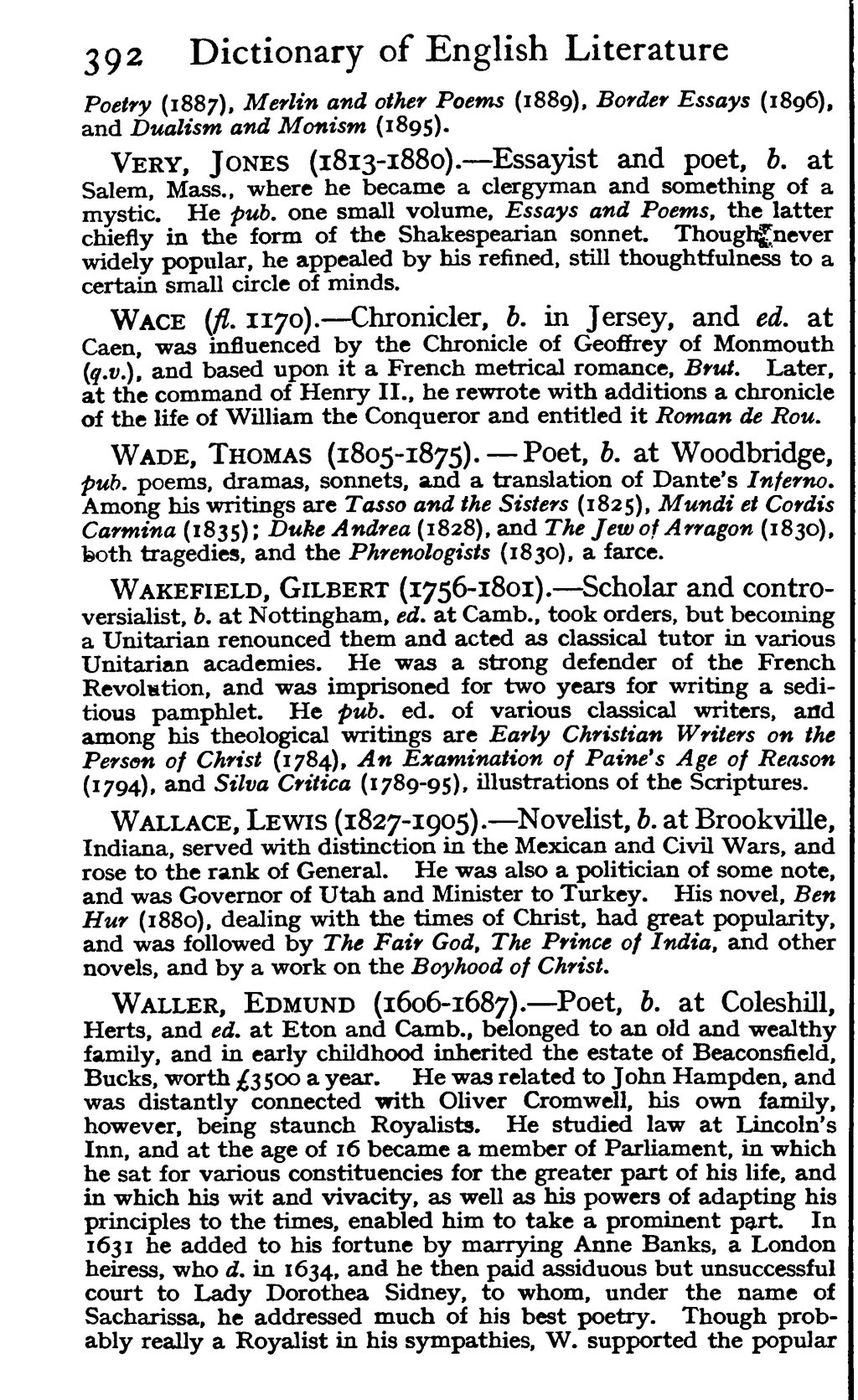Poetry (1887), Merlin and other Poems (1889), Border Essays (1896), and Dualism and Monism (1895).
Very, Jones (1813-1880).—Essayist and poet, b. at Salem, Mass., where he became a clergyman and something of a mystic. He pub. one small volume, Essays and Poems, the latter chiefly in the form of the Shakespearian sonnet. Though never widely popular, he appealed by his refined, still thoughtfulness to a certain small circle of minds.
Wace (ft. 1170).—Chronicler, b. in Jersey, and ed. at Caen, was influenced by the Chronicle of Geoffrey of Monmouth (q.v.), and based upon it a French metrical romance, Brut. Later, at the command of Henry II., he rewrote with additions a chronicle of the life of William the Conqueror and entitled it Roman de Rou.
Wade, Thomas (1805-1875).—Poet, b. at Woodbridge, pub. poems, dramas, sonnets, and a translation of Dante's Inferno. Among his writings are Tasso and the Sisters (1825), Mundi et Cordis Carmina (1835); Duke Andrea (1828), and The Jew of Arragon (1830), both tragedies, and the Phrenologists (1830), a farce.
Wakefield, Gilbert (1756-1801).—Scholar and controversialist, b. at Nottingham, ed. at Camb., took orders, but becoming a Unitarian renounced them and acted as classical tutor in various Unitarian academies. He was a strong defender of the French Revolution, and was imprisoned for two years for writing a seditious pamphlet. He pub. ed. of various classical writers, and among his theological writings are Early Christian Writers on the Person of Christ (1784), An Examination of Paine's Age of Reason (1794), and Silva Critica (1789-95), illustrations of the Scriptures.
Wallace, Lewis (1827-1905).—Novelist, b. at Brookville, Indiana, served with distinction in the Mexican and Civil Wars, and rose to the rank of General. He was also a politician of some note, and was Governor of Utah and Minister to Turkey. His novel, Ben Hur (1880), dealing with the times of Christ, had great popularity, and was followed by The Fair God, The Prince of India, and other novels, and by a work on the Boyhood of Christ.
Waller, Edmund (1606-1687).—Poet, b. at Coleshill, Herts, and ed. at Eton and Camb., belonged to an old and wealthy family, and in early childhood inherited the estate of Beaconsfield, Bucks, worth £3500 a year. He was related to John Hampden, and was distantly connected with Oliver Cromwell, his own family, however, being staunch Royalists. He studied law at Lincoln's Inn, and at the age of 16 became a member of Parliament, in which he sat for various constituencies for the greater part of his life, and in which his wit and vivacity, as well as his powers of adapting his principles to the times, enabled him to take a prominent part. In 1631 he added to his fortune by marrying Anne Banks, a London heiress, who d. in 1634, and he then paid assiduous but unsuccessful court to Lady Dorothea Sidney, to whom, under the name of Sacharissa, he addressed much of his best poetry. Though probably really a Royalist in his sympathies, W. supported the popular
